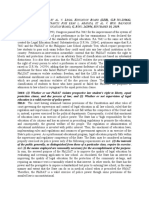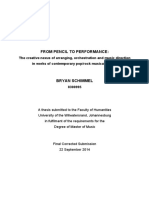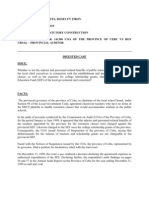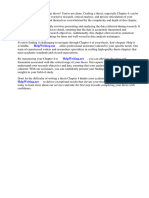UP VS CA Digest
UP VS CA Digest
Uploaded by
Breth1979Copyright:
Available Formats
UP VS CA Digest
UP VS CA Digest
Uploaded by
Breth1979Copyright
Available Formats
Share this document
Did you find this document useful?
Is this content inappropriate?
Copyright:
Available Formats
UP VS CA Digest
UP VS CA Digest
Uploaded by
Breth1979Copyright:
Available Formats
UP Board of Regents VS Court of Appeals and AROKIASWAMY WILLIAM MARGARET CELINE G.R. No. 134625.
August 31, 1999 Facts: Private respondent Ms. Arokiaswamy William Margaret Celine a citizen of India enrolled doctoral program in UP CSSP Diliman QC. She is ready for oral defense with selected panel members Drs. E. Arsenio Manuel, Serafin Quiason, Sri Skandarajah, Noel Teodoro, and Isagani Medina, the last included as the deans representative. Even though Dr. Medina noticed that there were portions of her dissertation that was lifted from different sources without proper acknowledgement, she was still allowed to continue to with her oral defense. Four (4) out five (5) give her a passing mark with condition to incorporate the suggestion made by the panel members. Dr. Medina did not sign the approval form. Dr. Teodoro also noted that a revision should be submitted. On March 24, 1993, The CSSP College Faculty Assembly approved her graduation pending the final revised copies of her dissertation. Private respondent submitted the supposedly final revised copies although petitioners maintained that suggestions were not incorporated. She left a copy for Dr. Teodoro and Dr. Medina and did not wait for their approval relying to the Dean Paz remarks during previous meeting that a majority vote was sufficient for her to pass. The supposedly revised copies were later disapproved by Dr. Teodoro and Dr. Medina. Private respondent was disappointed with the administration. She charge Dr. Diokno and Medina with maliciously working for the disapproval of her dissertation and further warned Dean Paz against encouraging perfidious act against her. Dean Paz attempts to exclude the private respondent in the graduating list in a letter addressed to the Vice Chancellor for Academic Affairs (Dr. Milagros Ibe), pending for clarification of her charges against panel members and accusations relating to her dissertation. Unfortunately the letter did not reach on time and the respondent was allowed to graduate. Dean Paz wrote a letter that she would not be granted an academic clearance unless she substantiated the accusations. In a letter addressed to Dean Paz, Dr. Medina formally charged private respondent with plagiarism and recommended for the withdrawal of her doctorate degree. Dean Paz formed an ad-hoc committee (Ventura Committee) to investigate and recommend to Chancellor Dr. Roman to withdraw her doctorate degree. Private respondent was informed of the charges in a letter. Ventura Committee finds at 90 instances or portions of thesis lifted from other sources with no proper acknowledgement. After it was unanimously approved and endorsed from the CSSP and Univ. Council the recommendation for withdrawal was endorsed to Board of Regents who deferred its actions to study further for legal implications. Private respondent was provided with a copy of findings and in return she also submitted her written explanation. Another meeting was scheduled to discuss her answer. Zafaralla Committee was also created and recommends private respondent for withdrawal of her degree after establishing the facts the there were massive lifting from published sources and the private respondent also admits herself of being guilty of plagiarism. On the basis of the report and recommendation of the University Council, the Board of Regents send a letter to inform private respondent that it was resolved by majority to withdraw your doctorates degree. On August 10, 1995, private respondent then filed a petition for mandamus with a prayer for a writ of preliminary mandatory injunction and damages to RTC QC. She alleged that petitioners had unlawfully withdrawn her degree without justification and without affording her procedural due process. She prayed that petitioners be ordered to restore her degree and to pay her P500, 000.00 as moral and exemplary damages and P1, 500,000.00 as compensation for lost earnings. RTC dismissed for lack of merit. The Court of Appeals reversed the lower courts decision and ordered to restore her doctorates degree. Issue/s: 1. Whether or not the Court of Appeals erred in granting the writ of mandamus and ordering petitioners to restore doctoral degree. 2. Whether or not the court of appeals erred in holding that respondents doctoral degree cannot be recalled without violating her right to enjoyment of intellectual property and to justice and equity. Held/Ruling: The decision of Court of Appeals was reversed. 1. Yes. The court of appeals decisions was based on grounds that the private respondent was denied of due process and that she graduated and no longer in the ambit of disciplinary powers of UP. In all investigations held by the different committee assigned to investigate the charges, the private respondent was heard on her defense. In fact she was informed in writing about the charges and was provided
with a copy from the investigating committee. She was asked to submit her explanation which she forwarded. Private respondent also discussed her case with the UP Chancellor and Zafaralla Committee during their meetings. She was given the opportunity to be heard and explain her side but failed to refute the charges of plagiarism against her. The freedom of a university does not terminate upon the "graduation" of a student, as the Court of Appeals held because the "graduation" of such a student that is in question. The investigation began before graduation. She was able to graduate because there were many investigations conducted before the Board finally decided that she should not have been allowed to graduate. 2. Yes. The court held that academic freedom is guaranteed to institutions of higher learning by Art XIV of the 1987 Constitution. This freedom includes deciding whom a university will confer degrees on. If the degree is procured by error or fraud then the Board of Regents, subject to due process being followed, may cancel that degree. Art. XIV, Section 5 par. 2 of the Constitution provides that "academic freedom shall be enjoyed in all institutions of higher learning." It is a freedom granted to "institutions of higher learning" which is thus given "a wide sphere of authority certainly extending to the choice of students." If such institution of higher learning can decide who can and who cannot study in it, it certainly can also determine on whom it can confer the honor and distinction of being its graduates.
You might also like
- Cite A Recent or Current Event in The Philippines or in The World Where The Rule of Law Prevailed and How This Affected That Society or CommunityDocument2 pagesCite A Recent or Current Event in The Philippines or in The World Where The Rule of Law Prevailed and How This Affected That Society or Communityhalapatry100% (1)
- Garcia v. Faculty Admission Committee, 68 SCRA 277Document2 pagesGarcia v. Faculty Admission Committee, 68 SCRA 277Jasmin Macabacyao100% (2)
- Hamburger Paragraph, Essay, and ThesisDocument3 pagesHamburger Paragraph, Essay, and ThesisJenniferLee100% (3)
- Angara Vs Electoral CommissionDocument3 pagesAngara Vs Electoral CommissionGenevieve Kristine ManalacNo ratings yet
- Calalang v. WilliamsDocument2 pagesCalalang v. WilliamsIldefonso Hernaez100% (1)
- In Re Del Castillo DigestedDocument3 pagesIn Re Del Castillo Digestedheirarchy100% (4)
- Angara V ComelecDocument2 pagesAngara V ComelecAronJamesNo ratings yet
- Chavez v. JBC DigestDocument3 pagesChavez v. JBC DigestKarla Marie TumulakNo ratings yet
- 5 Pimentel V, Legal Education BoardDocument2 pages5 Pimentel V, Legal Education Boardchristopher1julian1a100% (3)
- Action For Damages: Separate Civil Action or Quasi-Delict) The Complaint For DamagesDocument2 pagesAction For Damages: Separate Civil Action or Quasi-Delict) The Complaint For DamagesMaria LopezNo ratings yet
- UP BOR vs. CA Case Digest - Richelle SendinDocument3 pagesUP BOR vs. CA Case Digest - Richelle SendinAlexis CatuNo ratings yet
- FROM PENCIL TO PERFORMANCE: The Creative Nexus of Arranging, Orchestration and Music Direction in Works of Contemporary Pop-Rock Musical Theatre PDFDocument180 pagesFROM PENCIL TO PERFORMANCE: The Creative Nexus of Arranging, Orchestration and Music Direction in Works of Contemporary Pop-Rock Musical Theatre PDFDavidNo ratings yet
- English-Vietnamese Translations - UnnaturalnessDocument65 pagesEnglish-Vietnamese Translations - Unnaturalnessmaywayrandom100% (2)
- PHI 445 Week 3 Case Analysis Case Studies Lehman Brothers, British Petroleum, Monsanto, Merck, Goodyear, Perdue FarmsDocument3 pagesPHI 445 Week 3 Case Analysis Case Studies Lehman Brothers, British Petroleum, Monsanto, Merck, Goodyear, Perdue FarmsrollinsandrewNo ratings yet
- Up Board of Regents V. Court of Appeals, Gr. No. 134625, August 31, 1999 FactsDocument1 pageUp Board of Regents V. Court of Appeals, Gr. No. 134625, August 31, 1999 FactsJILLIAN SABADONo ratings yet
- FRANCISCO-VS-HOUSE-OF-REPRESENTATIVES - DigestDocument4 pagesFRANCISCO-VS-HOUSE-OF-REPRESENTATIVES - DigestSyd Geemson ParrenasNo ratings yet
- 158 Neri VS Senate, 549 SCRA 77 (2008)Document2 pages158 Neri VS Senate, 549 SCRA 77 (2008)Ali NamlaNo ratings yet
- CoTesCup Vs Sec of EducDocument1 pageCoTesCup Vs Sec of EducBiyaya BellzNo ratings yet
- Vargas V RillorazaDocument2 pagesVargas V RillorazaAndrea RioNo ratings yet
- In The Matter of Save The Supreme Court Judicial Independence and Fiscal Autonomy Movement v. Abolition of Judiciary Development Fund (JDF) and Reduction of Fiscal Autonomy-DigestDocument2 pagesIn The Matter of Save The Supreme Court Judicial Independence and Fiscal Autonomy Movement v. Abolition of Judiciary Development Fund (JDF) and Reduction of Fiscal Autonomy-DigestJaerelle HernandezNo ratings yet
- Case Digest 6 - Francisco Vs House of Rep (Constitutional Construction)Document2 pagesCase Digest 6 - Francisco Vs House of Rep (Constitutional Construction)AronJames100% (1)
- U.S. vs. Dorr DigestDocument2 pagesU.S. vs. Dorr DigestThea BarteNo ratings yet
- Consti Case Digest SEPARATION OF POWERDocument9 pagesConsti Case Digest SEPARATION OF POWERKaren CapaoNo ratings yet
- Imposition of Death Penalty - OppositionDocument4 pagesImposition of Death Penalty - OppositionMaeNo ratings yet
- Pambayang Kapasyahan: Enrique T. Garcia, Et Al. V. Comelec and Sangguniang Bayan of Morong, BataanDocument4 pagesPambayang Kapasyahan: Enrique T. Garcia, Et Al. V. Comelec and Sangguniang Bayan of Morong, Bataanrgtan3No ratings yet
- G.R. No. 141386 Digested CaseDocument2 pagesG.R. No. 141386 Digested CaseRoselyn Reyes100% (3)
- Canet v. Decena (Digest)Document2 pagesCanet v. Decena (Digest)Dredd Lelina100% (1)
- ArlinObiasca v. JeaneBasallote, G.R. No. 176707, February 17, 2010Document23 pagesArlinObiasca v. JeaneBasallote, G.R. No. 176707, February 17, 2010Estel Tabumfama0% (1)
- 01-Primicias v. Fugoso G.R. No. L-1800 January 27, 1948Document7 pages01-Primicias v. Fugoso G.R. No. L-1800 January 27, 1948Jopan SJNo ratings yet
- G.R. No. L-72873 PDFDocument2 pagesG.R. No. L-72873 PDFbrecht1980No ratings yet
- Manila Jockey Club v. Games and Amusement Board 107 Phil. 151 1960 Dado Arthur Jhon A.Document1 pageManila Jockey Club v. Games and Amusement Board 107 Phil. 151 1960 Dado Arthur Jhon A.Mike TeeNo ratings yet
- 11 Teves V Commission On AuditDocument2 pages11 Teves V Commission On AuditJude Thaddeus DamianNo ratings yet
- 8 in Re EdillonDocument2 pages8 in Re EdillonCedrick100% (1)
- Risos-Vidal vs. COMELECDocument1 pageRisos-Vidal vs. COMELECMarianne NicerNo ratings yet
- In Re Cunanan, Et - Al., 94 Phil. 534Document2 pagesIn Re Cunanan, Et - Al., 94 Phil. 534WrenNo ratings yet
- 5 Free Telephone Workers v. Min. of Labor (108 SCRA 757)Document3 pages5 Free Telephone Workers v. Min. of Labor (108 SCRA 757)A M I R A100% (3)
- Administrative Law Cases On Quasi-Judicial PowerDocument59 pagesAdministrative Law Cases On Quasi-Judicial PowerNorileisha Ramos AtienzaNo ratings yet
- Artigas - Natanauan Vs TolentinoDocument3 pagesArtigas - Natanauan Vs TolentinochrystelNo ratings yet
- Acevedo VsDocument7 pagesAcevedo Vsglaize587No ratings yet
- Case Digest of Tanada VsDocument1 pageCase Digest of Tanada VsGeorgette V. SalinasNo ratings yet
- Tanada V CuencoDocument2 pagesTanada V CuencoSui100% (3)
- G.R. No. 152295 Montesclaros vs. COMELECDocument2 pagesG.R. No. 152295 Montesclaros vs. COMELECRia N. HipolitoNo ratings yet
- People V Perfecto Case DigestDocument1 pagePeople V Perfecto Case DigestJuds JD100% (1)
- in Re ArgosinoDocument2 pagesin Re ArgosinoMir SolaimanNo ratings yet
- Election Law - Brillantes v. COMELEC Case DigestDocument4 pagesElection Law - Brillantes v. COMELEC Case DigestBenj Vasquez100% (1)
- Macarubbo Vs Atty Macarubbo (January 22, 2013)Document2 pagesMacarubbo Vs Atty Macarubbo (January 22, 2013)Katharina CantaNo ratings yet
- Sec. 32 Subic Bay Metropolitan Authority v. COMELEC - DigestDocument2 pagesSec. 32 Subic Bay Metropolitan Authority v. COMELEC - DigestLorenzo Elegio IIINo ratings yet
- 5.23 Nepomuceno Vs Surigao PDFDocument8 pages5.23 Nepomuceno Vs Surigao PDFEvan NervezaNo ratings yet
- Marcos Burial Ocampo vs. EnriquezDocument9 pagesMarcos Burial Ocampo vs. EnriquezMiley Lang100% (2)
- Art. 35 George Culhi HambonDocument3 pagesArt. 35 George Culhi HambonPolistico KresNo ratings yet
- Barcenas vs. House of RepresentativeDocument2 pagesBarcenas vs. House of RepresentativeAli NamlaNo ratings yet
- Marcos Vs ComelecDocument2 pagesMarcos Vs ComelecJairus Adrian VilbarNo ratings yet
- Rule 138 Sections 1-37 (Revised Rules of Court)Document8 pagesRule 138 Sections 1-37 (Revised Rules of Court)Sheila Eva Inumerables100% (1)
- In The Matter of Save The Supreme Court Judicial Independence and Fiscal Autonomy Movement vs. Abolition of Judiciary Development Fund (JDF) and Reduction of Fiscal AutonomyDocument3 pagesIn The Matter of Save The Supreme Court Judicial Independence and Fiscal Autonomy Movement vs. Abolition of Judiciary Development Fund (JDF) and Reduction of Fiscal AutonomyHans Henly Gomez100% (4)
- Oca V Judge Yu Case DigestDocument1 pageOca V Judge Yu Case DigestAbigail TolabingNo ratings yet
- Angarra Vs Electoral CommissionDocument5 pagesAngarra Vs Electoral CommissionVirgil Keith Juan PicoNo ratings yet
- Araneta V Gatmaitan, 101 Phil 328 (1957)Document2 pagesAraneta V Gatmaitan, 101 Phil 328 (1957)Michael Franc De Leon100% (1)
- In Re Cunanan 94 PHIL. 534, MARCH 18, 1954 FactsDocument2 pagesIn Re Cunanan 94 PHIL. 534, MARCH 18, 1954 FactsMagr EscaNo ratings yet
- 8 Calang Vs WilliamsDocument2 pages8 Calang Vs WilliamsRexNo ratings yet
- G.R. No. 146486 Digest By: Submitted: November 25, 2016 Facts of The CaseDocument2 pagesG.R. No. 146486 Digest By: Submitted: November 25, 2016 Facts of The CaseJay-ar Rivera BadulisNo ratings yet
- Rule 138 Attorneys and Admission To BarDocument19 pagesRule 138 Attorneys and Admission To Barerikha_araneta100% (1)
- UNIVERSITY OF THE PHILIPPINES BOARD OF REGENTS Vs CADocument4 pagesUNIVERSITY OF THE PHILIPPINES BOARD OF REGENTS Vs CAPrieti HoomanNo ratings yet
- Up Arokiaswamy Case AnalysisDocument2 pagesUp Arokiaswamy Case AnalysisCrispina ReyneraNo ratings yet
- PCGG v. Judge Peña Feb. 7, 1989Document24 pagesPCGG v. Judge Peña Feb. 7, 1989Andrea Ivanne100% (1)
- People V AlidoDocument6 pagesPeople V AlidoBreth1979No ratings yet
- Filamer Vs IACDocument3 pagesFilamer Vs IACBreth1979No ratings yet
- Bernardo vs. NLRCDocument6 pagesBernardo vs. NLRCBreth1979No ratings yet
- Tan v. RoseteDocument10 pagesTan v. Roseteida_chua8023No ratings yet
- Cuenco Vs CADocument9 pagesCuenco Vs CABreth1979No ratings yet
- Holiday Inn V NLRCDocument3 pagesHoliday Inn V NLRCBreth1979100% (1)
- de La Cruz v. Judge BersamiraDocument10 pagesde La Cruz v. Judge BersamiraBreth1979No ratings yet
- Fernandez Vs DimagibaDocument3 pagesFernandez Vs DimagibaBreth1979No ratings yet
- Pastor Vs CADocument8 pagesPastor Vs CABreth1979No ratings yet
- Kiok Loy Vs NLRC GR L-54334Document3 pagesKiok Loy Vs NLRC GR L-54334Breth1979No ratings yet
- Regino Vs Pangasinan CollegesDocument5 pagesRegino Vs Pangasinan CollegesBreth1979No ratings yet
- Genuino Vs NLRC GR 142732-33Document6 pagesGenuino Vs NLRC GR 142732-33Breth1979No ratings yet
- Jarantilla Vs CADocument5 pagesJarantilla Vs CABreth1979No ratings yet
- Amabe Vs Asian Construction Et Al GR 183233Document9 pagesAmabe Vs Asian Construction Et Al GR 183233Breth1979No ratings yet
- Christian Vs NLRC GR 79106Document3 pagesChristian Vs NLRC GR 79106Breth1979No ratings yet
- Univ Sto Tomas Vs Samahang Manggagawa NG UST GR 169940Document11 pagesUniv Sto Tomas Vs Samahang Manggagawa NG UST GR 169940Breth1979No ratings yet
- KMP Vs Trajano GR No L62306Document3 pagesKMP Vs Trajano GR No L62306Breth1979No ratings yet
- Associated Labor Union Vs Ferrer-Calleja GR No L-48367Document4 pagesAssociated Labor Union Vs Ferrer-Calleja GR No L-48367Breth1979No ratings yet
- Ibm Vs NLRC 198 Scra 586Document3 pagesIbm Vs NLRC 198 Scra 586Breth1979No ratings yet
- The Comparative Study of Credit Policy and Its Implementation of Nabil Bank, Everest Bank and Nic Bank"Document124 pagesThe Comparative Study of Credit Policy and Its Implementation of Nabil Bank, Everest Bank and Nic Bank"Bijaya DhakalNo ratings yet
- Dissertation Dedication and AcknowledgementsDocument8 pagesDissertation Dedication and AcknowledgementsBuyPsychologyPapersRanchoCucamonga100% (1)
- Rafika 1601240742 Academic WritingDocument4 pagesRafika 1601240742 Academic WritingRafika FairuzNo ratings yet
- The Role of Business Model Innovation: in Transitioning ULEVs To MarketDocument546 pagesThe Role of Business Model Innovation: in Transitioning ULEVs To MarketGavin D. J. HarperNo ratings yet
- Rimsky K JudissenoDocument308 pagesRimsky K JudissenoAndi Abd Khaliq SyukurNo ratings yet
- Bharathidasan University, Tiruchirappalli - 620 024. M.Phil. Physics (FT/PT) ProgrammeDocument8 pagesBharathidasan University, Tiruchirappalli - 620 024. M.Phil. Physics (FT/PT) ProgrammeJagan EashwarNo ratings yet
- Debriefing DissertationDocument5 pagesDebriefing DissertationBuyCustomPapersOnlineSingapore100% (1)
- Action Research Literature Review ExampleDocument5 pagesAction Research Literature Review Exampleafmzswxbbbbitf100% (1)
- Thesis Topics For Curriculum and InstructionDocument8 pagesThesis Topics For Curriculum and Instructioncarlapotierlafayette100% (1)
- DBA Thesis LengthDocument7 pagesDBA Thesis Lengthafkoliddh100% (2)
- Mci Thesis GuidelinesDocument4 pagesMci Thesis Guidelinesgerridominguezpalmdale100% (2)
- Thesis About Teachers PerformanceDocument4 pagesThesis About Teachers Performancel0dakyw1pon2100% (1)
- The Development of RAF Air Power Doctrine 1999-2013Document291 pagesThe Development of RAF Air Power Doctrine 1999-2013Islam IslamNo ratings yet
- Watching TV Thesis StatementDocument8 pagesWatching TV Thesis Statementcourtneydaviswilmington100% (2)
- Chapter 4 Thesis Example PDFDocument7 pagesChapter 4 Thesis Example PDFmekenedavuj3100% (1)
- Literature Review Example Dissertation ProposalDocument6 pagesLiterature Review Example Dissertation Proposalaixgaoqif100% (1)
- Listing Thesis On ResumeDocument4 pagesListing Thesis On Resumegbxm8h7g100% (2)
- Sample Dissertation Abstract HumanitiesDocument4 pagesSample Dissertation Abstract HumanitiesPaperWritersSingapore100% (1)
- Bachelor Thesis AstronomyDocument5 pagesBachelor Thesis Astronomyijofwkiig100% (2)
- BAS-3 Session 3Document46 pagesBAS-3 Session 3NguyenDa TrieuNo ratings yet
- Res Crim A-2 (Preliminary-Pages)Document9 pagesRes Crim A-2 (Preliminary-Pages)HarrenNo ratings yet
- Rtu ThesisDocument4 pagesRtu Thesispeggyjohnsonsiouxfalls100% (2)
- Guidelines For Submitting Document in Urkund For Similarity CheckDocument3 pagesGuidelines For Submitting Document in Urkund For Similarity Checksonu peterNo ratings yet
- Ubc 2010 Fall Kwon Hyukchan PDFDocument389 pagesUbc 2010 Fall Kwon Hyukchan PDFElie IssaNo ratings yet
- Lincoln CathedralDocument178 pagesLincoln CathedralSpamela SpamdersonNo ratings yet
- Writing A Thesis Statement in Third PersonDocument6 pagesWriting A Thesis Statement in Third Personygsyoeikd100% (2)












































































































